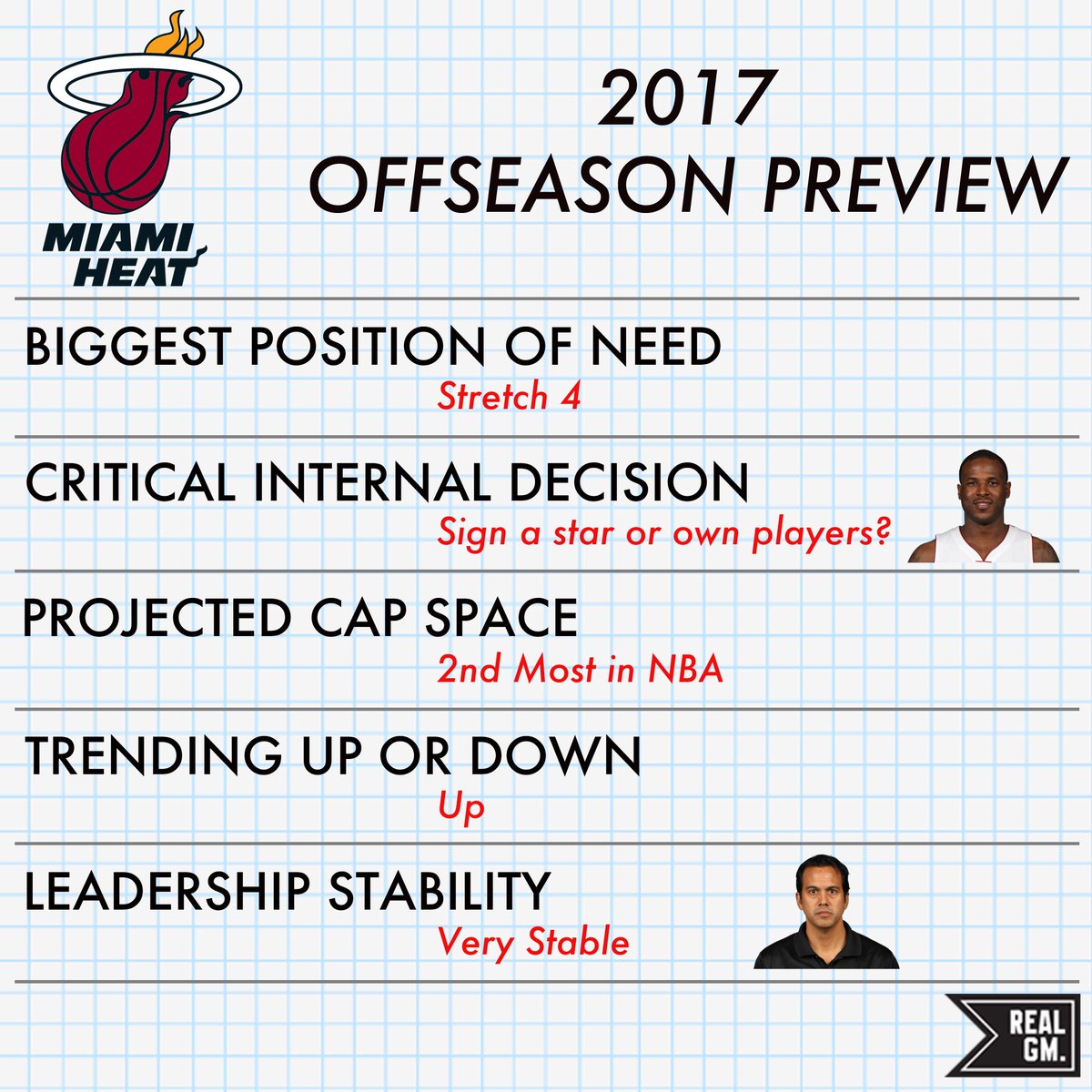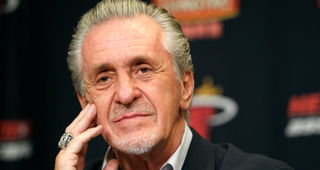The Miami Heat played like two different teams over the course of the 16-17 season. In the first half, Miami looked like a shallow team that didn’t have the depth to overcome a host of injuries, as they went 11-30. Over the final 41 games, the Heat were a juggernaut with a 13 game winning streak highlighting a 30-11 finish. The season ultimately ended in disappointment, as Miami missed the postseason for the second time in three years. But there is a lot of reason for optimism for the future. It is a tricky road for the Heat, but one that Pat Riley has successfully navigated before, even as recently as last summer.
Miami had a difficult choice to make last July. Hassan Whiteside was a free agent, fresh off establishing himself as one of the better centers in the NBA. Dwyane Wade, a franchise icon for over a decade, was also a free agent. Because the Heat lacked Bird Rights on Whiteside, they had to use cap space to give him a max contract. This meant moving on from Wade in what was a somewhat tumultuous exit from the only NBA home he had ever known. Miami also renounced Luol Deng, who had rehabbed his value while playing for the Heat. These moves signified Whiteside was a priority and someone Miami was building around for the foreseeable future.
With Whiteside locked in as a franchise centerpiece alongside Goran Dragic, who Miami had re-signed to a long-term contract the previous year, Riley went about filling out the roster on low-risk, high-reward candidates. It took a while for them to gel, but the Heat hit on just about every move they made last summer.
Luke Babbitt was acquired for the low cost of a second round pick in a salary dump from New Orleans. With Josh McRoberts suffering an injury that kept him out for most of the season, Babbitt became Miami’s starting power forward and gave the Heat a stretch 4 element, as he shot over 41 percent on three-pointers.
Derrick Williams was signed to give Miami some depth up front, but didn’t really work out and the team and Williams amicably parted ways midseason. Okaro White was added in place of Williams and showed enough promise to land a long term contract. Udonis Haslem was re-signed up front, but he’s more of a coach on the floor and a locker room leader at this point of his career.
Miami made two more additions in the frontcourt in signing James Johnson and Willie Reed. Johnson was arguably the best value signing of the summer. He far outperformed his $4 million contract and was one of Miami's best players in the second half of the season. Reed gave Miami solid backup center play behind Whiteside and showed he could be a rotation player for the first time in his NBA career.
Miami did a lot of work to rebuild the backcourt as well. Wayne Ellington was added to give the team some three-point shooting in place of Wade. He also missed time with injury, as did most of the Heat roster, but shot nearly 38 percent from downtown and gave Miami solid bench scoring. Miami also added Rodney McGruder, who was initially a training camp body before he developed into a consistent starter that played in a team-high 78 games.
The Heat then matched an offer sheet from the Brooklyn Nets for Tyler Johnson. The size of the contract ($50 million over four years) surprised many around the NBA, but with only Dragic returning as a solid backcourt performer, Miami couldn’t let Johnson get away and matched. Johnson proved to be worth his deal, with continued solid play off the bench.
As free agency was wrapping up and teams were headed on vacation prior to the start of training camp, Miami used their Room Exception to sign Dion Waiters. Waiters received no offers as a restricted free agent and was renounced late in the summer by Oklahoma City, leaving him with limited options. Miami, still looking for additional bench scoring, signed Waiters on a bargain contract.
What do almost all of these moves have in common? They were cheap contracts for only a year or two. That protects the team, but leaves them in a tough position if the additions pan out. And that is what Miami faces this summer.
James Johnson, Waiters, Babbitt, and Reed are all likely to be free agents. Waiters and Reed have player options that they will almost assuredly decline to seek long-term deals for more money. Ellington, McGruder, and White all have non-guaranteed contracts, as does holdover Josh Richardson. Haslem is also a free agent, but he will sign for whatever amount the Heat can give him after all their other additions are brought in. That is a total of nine players who could be out of the picture in Miami, most of whom were rotation players.
In addition, the Heat and Chris Bosh have reached resolution that will allow Miami to waive him without fear of his salary returning to their cap sheet if he returns to play elsewhere. That leaves an NBA-low five players under a guaranteed contract for the coming season: Whiteside, Dragic, Tyler Johnson, McRoberts, and Justise Winslow, who saw his sophomore season limited to just 18 games after injury.
This leaves Miami in one of the most interesting situations in all of the NBA this summer. We’ve seen what Riley can do when he has cap space as he did in 2010 with LeBron James and Chris Bosh. But this time around he has some good players in Whiteside and Dragic, but no superstar, like he had in Wade, to recruit their friends to Miami.
Nevertheless, expect the Heat to be linked with most of the free agents who are taking meetings this summer, Gordon Hayward chief among them. Hayward would fill a need for a scoring wing and would fit nicely with Whiteside and Dragic. Miami is also a sneaky team to watch in trade talks for Paul George. While, the Heat are lacking some in trade assets to get a deal done, they won’t be scared off by George’s desire to play for the Lakers. Riley and Erik Spoelstra know that they could change George’s mind and sell him on staying in South Beach.
In addition, with Tyler Johnson’s contract set to spike to over $19 million for the 2018-19 season (in increase of nearly $14 million due to Miami matching his offer sheet), this could be the last summer in a while that Miami will have max cap space to pursue superstars on the open market. This increases the likelihood that the Heat will look to land a big fish this summer.
But when you go fishing for big ones, you have to let the smaller fish go. That is where things get difficult for Miami. They should be able to generate enough cap space to land a major player in free agency or trade, but it will mean letting productive players like James Johnson, Waiters, Babbitt, and Reed go. Possibly Ellington, Richardson, McGruder and White will have to go too. They can probably work it to keep a handful of those guys, but Johnson and Waiters have proven worthy of bigger contracts than what Miami will be able to give them, should the Heat land a star.
If Miami strikes out on landing a star, they’ll probably bring back James Johnson and Dion Waiters, this time on bigger contracts, and then use the remainder of their cap space to add targeted veterans, similar to last summer. The challenge will be convincing Johnson and Waiters to wait on signing, when both should have suitors immediately upon free agency opening on July 1st.
Miami also has the final pick of the non-playoff teams at 14th overall. In a deep draft, they should be able to add a good player. But expecting that player to have an impact as a rotation player right out of the gate might be a stretch.
The Heat with cap space is a scary thought for the rest of the NBA. It gives Riley the best tool to add to his roster. Last year started horribly, rebounded better than anyone could have expected, before ending in disappointment. With several avenues for improvement and one of the best situations in the entire league, it isn’t likely we’ll see next season, or any season for the next few years, end in anywhere near as much disappointment.
Offseason Details
Guaranteed Contracts (5): Goran Dragic, Tyler Johnson, Josh McRoberts, Hassan Whiteside, Justise Winslow (assumes Chris Bosh will be waived)
Partial/Non-Guaranteed Contracts (4): Wayne Ellington, Rodney McGruder, Josh Richardson, Okaro White
Potential Free Agents (5): Luke Babbitt (UFA), Udonis Haslem (UFA), James Johnson (UFA), Willie Reed (UFA – Player Option), Dion Waiter (UFA – Player Option)
“Dead” Money on Cap (0): None
First Round Draft Pick(s): Pick #14
Projected Cap Space: $36,582,760
Maximum Cap Space: $39,907,264




